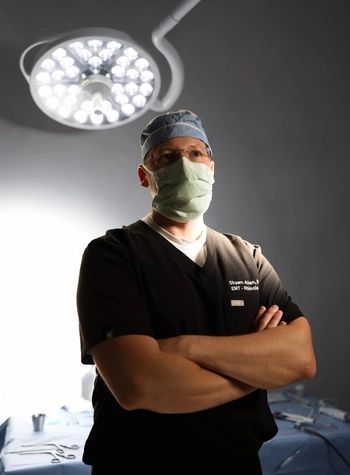Dr. Shawn Allen has either authored or reviewed and approved this content.
Page Updated:Allergic fungal sinusitis (AFS) is a relatively rare condition that often presents with symptoms similar to a common sinus infection. However, allergic fungal sinusitis is the result of an allergic response to fungal growth in the sinus rather than a bacterial infection, and requires specialized medical and surgical treatment to prevent serious
Trusted Source
Allergic fungal rhinosinusitis: a review
Glass D, Amedee RG
Go to Source
complications.
Board-Certified Otolaryngologist (ENT) and fellowship-trained Rhinologist (sinus specialist) Dr. Shawn Allen is uniquely qualified to diagnose and effectively treat allergic fungal sinusitis in patients from Houston, The Woodlands, and surrounding communities in Texas.


Symptoms of allergic fungal sinusitis are often similar to those of a bacterial sinus infection and may include:
Patients with compromised immune systems, such as patients taking immunosuppressive drugs, patients with cancer or who are undergoing chemotherapy, patients with uncontrolled diabetes, and patients who are HIV positive, are more likely to develop severe invasive fungal sinus infections. These patients may experience symptoms such as:
Allergic fungal sinusitis may be classified as noninvasive or invasive. Noninvasive infections are localized to the nose and sinus areas and involve fungal contamination of the sinuses without tissue invasion, whereas invasive fungal sinusitis may invade tissues and spread to other parts of the body such as the eyes or the brain.
Allergic Fungal Rhinosinusitis: This form of fungal sinusitis is caused by an allergic reaction to common fungi. Initially, patients may encounter symptoms similar to allergy symptoms. As AFS progresses, the sinuses may become filled with thick mucus and often nasal polyps.
Saprophytic Fungus: With this type of fungal sinusitis, fungus or mold grows on top of mucus or mucus crusts, essentially living off of the mucus.
Fungus Ball (mycetoma): Here, fungi accumulate in the sinuses to form a ball or clump. As this mass grows in size, it can block the sinuses and impair sinus function.
Invasive fungal sinus infections are life-threatening medical and surgical emergencies, as these infections can destroy tissues rapidly and may escape through sinus walls to involve the eyes, skull, and/or brain.
Chronic Indolent/Granulomatous Sinusitis: This type of fungal sinus infection is rare, and typically is not seen in the United States. Here, an immune response to the presence of fungus leads to destruction of the lining of the nose, destroying nasal tissue.
Chronic Invasive Sinusitis: Chronic invasive fungal sinus infections are most commonly seen in patients with depressed immune systems, especially in patients with poorly controlled diabetes. These infections progress slower than more acute invasive fungal infections, but may also require aggressive treatment.
Acute Fulminant Invasive Fungal Sinusitis: This is the most severe form of fungal sinus infection seen in patients who have significantly compromised immune systems. With this type of fungal sinusitis, invading fungi can destroy the blood vessels in the lining of the nose and surrounding tissues, resulting in tissue death or necrosis. This infection may also spread to the eyes and brain, potentially resulting in blindness or death.

Allergic fungal sinusitis is suspected when CT imaging shows abnormal densities within sinuses suggesting calcifications and subsequently confirmed by the presence of allergic mucin (mucous growing fungi) identified through laboratory testing of mucus samples obtained during sinus surgery. Treatment of allergic fungal sinusitis nearly always requires a combination of surgical and medical approaches for long-term
Trusted Source
Schubert, Allergic fungal sinusitis: pathophysiology, diagnosis and management, Medical Mycology, Volume 47, Issue Supplement_1, 2009, Pages S324–S330, https://doi
Mark S
Go to Source
success.
Traditional endoscopic sinus approaches are preferred, as less invasive procedures often do not allow for complete clearance of mucin or ongoing management of this condition.
During endoscopic sinus surgery, a small camera called an endoscope and small surgical tools are introduced into the nasal cavity. These instruments are used to open and create windows into the sinuses involved with the disease. This allows for removal of fungal debris and mucus from within the sinuses, improves sinus drainage, and creates a more favorable environment for the introduction of topical medications often used for long-term control of the condition.
Learn More About Endoscopic Sinus Surgery
Medical treatment of allergic fungal sinusitis may include:

Fungal sinusitis ranges from an allergic response that, left unchecked, might cause significant inflammation and alter sinus anatomy over a long period of time, and more severe and potentially life-threatening cases where invasive fungal infection is present in patients with compromised immune systems. Dr. Shawn Allen specializes in the management of complex sinus conditions and disorders, and can provide the immediate and long-term care required to treat this rare and challenging condition to patients in Houston, The Woodlands, and nearby areas. To learn more, please contact us to schedule a consultation.
1 Glass D, Amedee RG. Allergic fungal rhinosinusitis: a review. Ochsner J. 2011 Fall;11(3):271-5. PMID: 21960761; PMCID: PMC3179194. Available: https://pubmed.ncbi.nlm.nih.gov/21960761/. Accessed February 14, 2023.
2 Cleveland Clinic. Fungal Sinusitis. Available: https://my.clevelandclinic.org/health/diseases/17012-fungal-sinusitis-fungal-sinus-infection#management-and-treatment. Accessed February 14, 2023.
3 Mark S. Schubert, Allergic fungal sinusitis: pathophysiology, diagnosis and management, Medical Mycology, Volume 47, Issue Supplement_1, 2009, Pages S324–S330, https://doi.org/10.1080/13693780802314809. Accessed February 14, 2023.
Dr. Shawn Allen has either authored or reviewed and approved this content.
Page Updated: